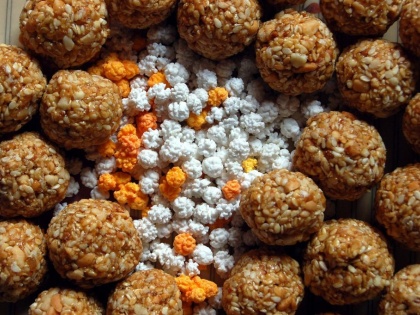Makar Sankranti 2022: Makar Sankranti only Hindu festival celebrated on fixed calendric day, check out it's astronomical significance
By Lokmat English Desk | Published: January 14, 2022 12:00 PM2022-01-14T12:00:43+5:302022-01-14T12:14:13+5:30
Do you know Makar Sankranti is the only Indian festival that has an English date? Yes, Makar Sankranti only ...

Makar Sankranti 2022: Makar Sankranti only Hindu festival celebrated on fixed calendric day, check out it's astronomical significance
Do you know Makar Sankranti is the only Indian festival that has an English date? Yes, Makar Sankranti only Hindu festival celebrated on the fixed calendar day. The Sun is seen entering one zodiac sign every month and moving through twelve zodiac signs throughout the year. Out of these twelve Sankrantis, we celebrate the transition of the Sun from Sagittarius to Capricorn as Makar Sankranti. Currently, the Sun enters Capricorn on January 14-15, and India celebrates Makar Sankranti on this date. And this festival is the only festival that is according to the English calendar
The basic concept of this festival is the beginning of descent rather than the transition to Capricorn. Daily observations of the sun show that the sun moves north or south for six months. On December 22, the sun is at its southernmost point, with the longest night and the shortest day. After this, the sun begins to move slowly as it moves northwards. Due to the winter in the Northern Hemisphere, increasing daytime after December 22, increasing the heat of the sun is conducive to increasing efficiency in agriculture, animal husbandry, and daily life. Shab-e-Yalda, Uttarakhand was celebrated as Dongzi in China and Toji in Japan.
In India too, the descent of the sun has been celebrated since the Vedic period. Around the first century, the Sun entered Capricorn on 22nd December. During this time, due to the association of agricultural culture, grains and fruits ripened in the fields were offered to God, and varieties were given to each other. But due to the speed of the Earth's transit, the Capricorn transit of the Sun goes on an average of 5.5 days in 400 years and now it falls on 14th January 15th. Makar Sankraman is celebrated all over India under different names like Lohri (Punjab), Bhogali Bihu (Assam), Khichdi Sankranti (Bihar), Poush Sankranti (Bengal), Pongal (Tamil Nadu), Makar Vallaku (Kerala).
Open in app